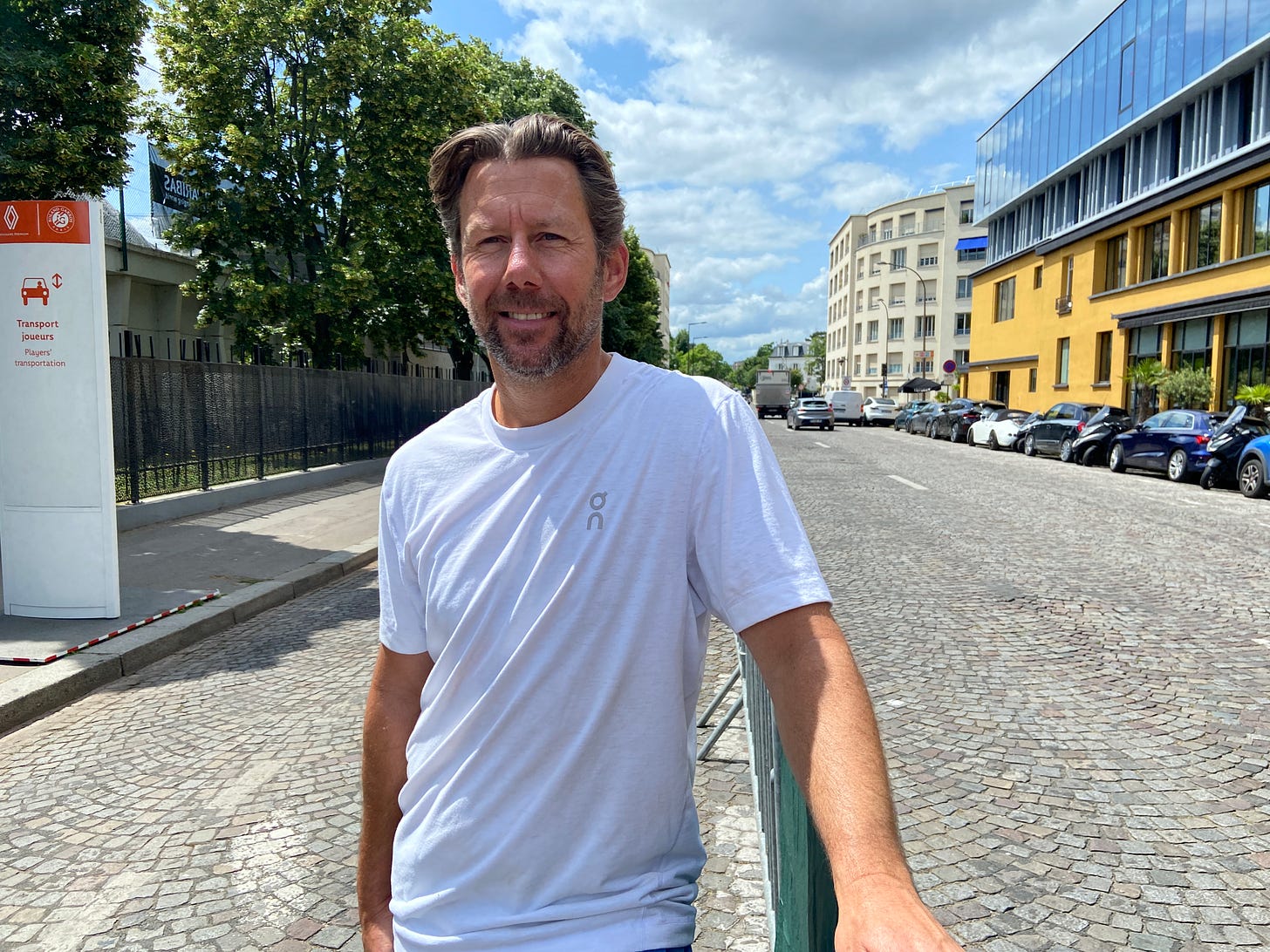The View from Iga Swiatek's Corner
An in-depth interview with Wim Fissette, the coach of defending Roland Garros champion Iga Swiatek.
PARIS, France — With Iga Swiatek into the quarterfinals and still in hot pursuit of a historic fourth consecutive French Open title—which would be the first ever four-peat here on the women’s side in the Open Era, and the first overall since Suzanne Lenglen way back in 1923—I could think of no better person to interview for Bounces subscribers than the veteran coach whom Swiatek chose to help her reach her lofty ambitions: Wim Fissette.
Meet Wim Fissette
Swiatek, whose five major singles titles still put her ahead of any man or woman born in 1988 or later, chose a coach with six major titles under his own belt as a coach.
Fissette, 45, has been one of the most successful coaches in women’s tennis this century, working with a diverse list of players.
He started on the tour by helping his fellow Belgian Kim Clijsters in her wildly successful return from maternity leave, guiding her to three major wins between 2009 and 2011. Fissette then coached Sabine Lisicki on her run to the 2013 Wimbledon final, and coached Simona Halep on her run to the French Open final a year later.
After a successful stint with Victoria Azarenka—interrupted by her pregnancy, maternity leave, and subsequent custody struggles—Fissette coached Angelique Kerber to the 2018 Wimbledon title. After another stretch with Azarenka, Fissette began coaching Naomi Osaka in late 2019, and led her to her third and fourth major titles.
The most impressive Fissette stat for my money: he coached five different players to wins over the legendary Serena Williams during this stretch: Clijsters, Lisicki, Halep, Azarenka, Kerber, and Osaka. Five wins “against Serena” is a ton, to be clear: Fissette had more wins “against Serena” to his name as coach than any individual player did during that ~12 year timeframe.
After a stint with Zheng Qinwen, Fissette again worked with Osaka for most of last year on her return from maternity leave. But when the two split after the 2024 U.S. Open, Swiatek soon scooped him up, having herself parted with her longtime coach Tomasz Wiktorowski shortly after.
Because so few others could match pedigrees like they can, the Swiatek-Fissette pairing was easy to see coming. “The most obvious name on Swiatek’s radar, I would think, would be Wim Fissette, the Belgian coach who recently parted with Osaka,” I wrote when the news of her split with Wiktorowski came in Bounces’ first week of existence.
The would-be dream team hasn’t had an easy ride, however: Swiatek was handed a one-month ban from a positive test late last year. On court this year, Swiatek’s had a few stumbles in the mid-late stages of tournaments; she hasn’t reached the final of any tournament since a year ago at Roland Garros. As a result, Swiatek’s ranking has slipped to No. 5, the lowest it’s been in more than three years.
But to my eye, the way Fissette was able to help Swiatek figure out how to turn around her fourth round match against Elena Rybakina here on Sunday—a match in which Swiatek was getting clobbered before Fissette convinced her to change her return position early in the second set—was the best evidence yet that this partnership can pay dividends when it matters most for Swiatek: which is here at Roland Garros.
My interview with Fissette took place in the players’ restaurant under Court Philippe Chatrier within an hour of that win over Rybakina, but our wide-ranging conversation wasn’t focused only on that win. I asked Fissette about the beginning and the breadth of his work with Swiatek, her main rivals (including Aryna Sabalenka, Coco Gauff, and her frequent tormentor, Jelena Ostapenko), the challenges of how Swiatek approaches the non-stop tour schedule, the division of work between himself and Swiatek’s psychologist Daria Abramowicz, and much more.
Fissette has been one of my favorite people to interview in tennis for more than a decade now: in a sport where many hide behind cliches, Fissette is always refreshingly honest and candid, and I was again struck in our latest chat by his openness and revealing answers.
I really do think this interview for Bounces—which clocks in at about 3,000 words below the paywall—will be worthwhile for anyone who wants to better understand Swiatek and, thereby, the outlook of how the business end of Roland Garros is likely to unfold on the women’s side. I learned a lot during our conversation, and I think you will learn a lot from reading it, too, so I sure do hope you can subscribe to check it out!
Only about 11 percent of Bounces subscribers are currently at a paid level; I would love to grow that number, both so more folks can read all the things behind the paywalls, and also to be able sustain and continue the sort of travel and work I’m doing here on the road with the tennis tours. Hope you can join in for the ride! Thanks! -Ben







